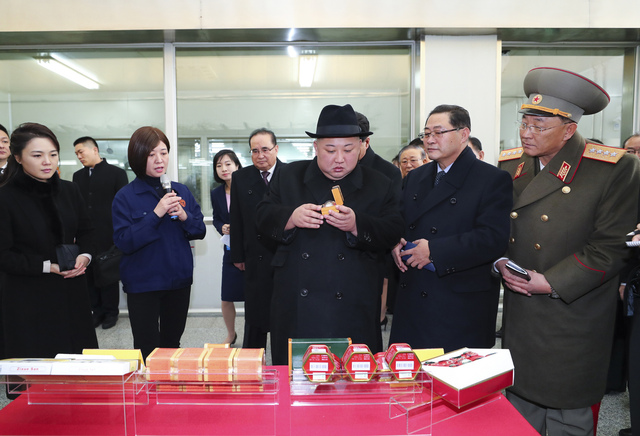 |
|
North Korean leader Kim Jong-un and Chinese President Xi Jinping talk before their luncheon at the Beijing Hotel on Jan. 9. (Beijing/AFP)
|
Two leaders focused on special longstanding relationship between ruling parties
In terms of both content and format, the fourth summit between North Korean leader Kim Jong-un and Chinese President Xi Jinping can be described as a “new leap forward” and a “new honeymoon” declaration in China-North Korea relations, as the two countries celebrate the 70th anniversary of the establishment of diplomatic relations this year. During their summit, the two leaders announced they’d agreed for Xi to officially visit North Korea for the first time since he became president, which is slated to be the biggest event in their bilateral relationship this year. First of all, the reports on the Korean Central News Agency (KCNA) and Xinhua News on Jan. 10 placed a major emphasis on the extent to which Kim and Xi value China-North Korea relations. The KCNA described the two sides’ relationship as a “trusting comradeship supported by the most faithful and rugged roots in this world, an invincible friendship that remains steadfast in any storm.” Xi himself said that the “China-North Korea relations have opened a new chapter in history.” In addition to this, Kim sent a strong signal about boosting China’s influence over Korean Peninsula issues by emphasizing China’s role in various areas, including North Korea-US denuclearization talks, economic development and improving the public livelihood. Whereas last year North Korea and China focused on the protocols of ordinary intergovernmental relations, this time they emphasized the traditional special relationship between the two ruling parties, sending the message that the intergovernmental and interparty relationships had been fully restored. Such intentions were manifest in Kim traveling 19 hours on his personal train, which is a symbol of North Korea and China’s traditional amity, instead of flying on his personal plane, called Chammae-1, meaning “goshawk”; having lunch at the Beijing Hotel, a former favorite of his grandfather and former North Korean leader Kim Il-sung; having his visit to China announced not by North Korea’s Foreign Ministry but by the Workers’ Party of Korea’s Foreign Liaison Department, which handles interparty relations; and emphasizing party titles rather than government titles in that announcement. “This goes beyond showing that North Korea has coordinated its negotiating strategy with China prior to the North’s talks with the US. Chairman Kim is showing that his ‘new way’ and ‘plan B’ mean he’ll move forward with China in the event that the negotiations with the US don’t work out,” said Cho Sung-ryul, senior research fellow for the Institute for National Security Strategy.
 |
|
North Korean leader Kim Jong-un looks over products at the 300-year-old Tong Ren Tang Chinese Medicine Co. in Beijing on Jan. 10. (Beijing/AP)
|







